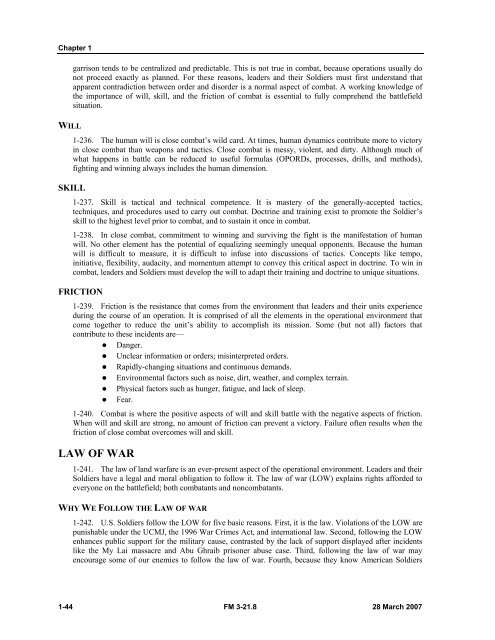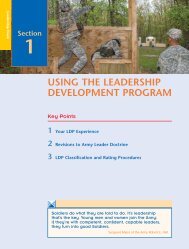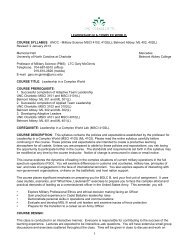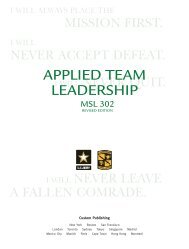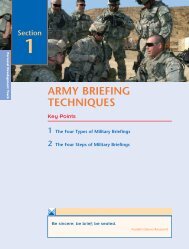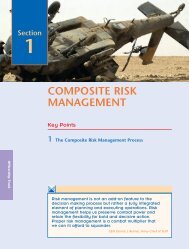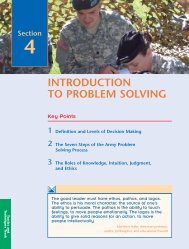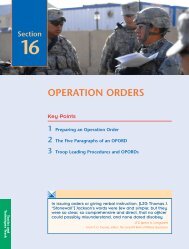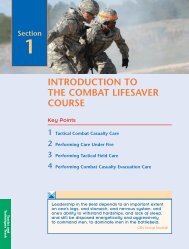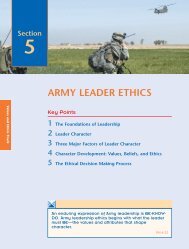Infantry Rifle Platoon and Squad - Sakai
Infantry Rifle Platoon and Squad - Sakai
Infantry Rifle Platoon and Squad - Sakai
Create successful ePaper yourself
Turn your PDF publications into a flip-book with our unique Google optimized e-Paper software.
Chapter 1<br />
WILL<br />
garrison tends to be centralized <strong>and</strong> predictable. This is not true in combat, because operations usually do<br />
not proceed exactly as planned. For these reasons, leaders <strong>and</strong> their Soldiers must first underst<strong>and</strong> that<br />
apparent contradiction between order <strong>and</strong> disorder is a normal aspect of combat. A working knowledge of<br />
the importance of will, skill, <strong>and</strong> the friction of combat is essential to fully comprehend the battlefield<br />
situation.<br />
1-236. The human will is close combat’s wild card. At times, human dynamics contribute more to victory<br />
in close combat than weapons <strong>and</strong> tactics. Close combat is messy, violent, <strong>and</strong> dirty. Although much of<br />
what happens in battle can be reduced to useful formulas (OPORDs, processes, drills, <strong>and</strong> methods),<br />
fighting <strong>and</strong> winning always includes the human dimension.<br />
SKILL<br />
1-237. Skill is tactical <strong>and</strong> technical competence. It is mastery of the generally-accepted tactics,<br />
techniques, <strong>and</strong> procedures used to carry out combat. Doctrine <strong>and</strong> training exist to promote the Soldier’s<br />
skill to the highest level prior to combat, <strong>and</strong> to sustain it once in combat.<br />
1-238. In close combat, commitment to winning <strong>and</strong> surviving the fight is the manifestation of human<br />
will. No other element has the potential of equalizing seemingly unequal opponents. Because the human<br />
will is difficult to measure, it is difficult to infuse into discussions of tactics. Concepts like tempo,<br />
initiative, flexibility, audacity, <strong>and</strong> momentum attempt to convey this critical aspect in doctrine. To win in<br />
combat, leaders <strong>and</strong> Soldiers must develop the will to adapt their training <strong>and</strong> doctrine to unique situations.<br />
FRICTION<br />
1-239. Friction is the resistance that comes from the environment that leaders <strong>and</strong> their units experience<br />
during the course of an operation. It is comprised of all the elements in the operational environment that<br />
come together to reduce the unit’s ability to accomplish its mission. Some (but not all) factors that<br />
contribute to these incidents are—<br />
• Danger.<br />
• Unclear information or orders; misinterpreted orders.<br />
• Rapidly-changing situations <strong>and</strong> continuous dem<strong>and</strong>s.<br />
• Environmental factors such as noise, dirt, weather, <strong>and</strong> complex terrain.<br />
• Physical factors such as hunger, fatigue, <strong>and</strong> lack of sleep.<br />
• Fear.<br />
1-240. Combat is where the positive aspects of will <strong>and</strong> skill battle with the negative aspects of friction.<br />
When will <strong>and</strong> skill are strong, no amount of friction can prevent a victory. Failure often results when the<br />
friction of close combat overcomes will <strong>and</strong> skill.<br />
LAW OF WAR<br />
1-241. The law of l<strong>and</strong> warfare is an ever-present aspect of the operational environment. Leaders <strong>and</strong> their<br />
Soldiers have a legal <strong>and</strong> moral obligation to follow it. The law of war (LOW) explains rights afforded to<br />
everyone on the battlefield; both combatants <strong>and</strong> noncombatants.<br />
WHY WE FOLLOW THE LAW OF WAR<br />
1-242. U.S. Soldiers follow the LOW for five basic reasons. First, it is the law. Violations of the LOW are<br />
punishable under the UCMJ, the 1996 War Crimes Act, <strong>and</strong> international law. Second, following the LOW<br />
enhances public support for the military cause, contrasted by the lack of support displayed after incidents<br />
like the My Lai massacre <strong>and</strong> Abu Ghraib prisoner abuse case. Third, following the law of war may<br />
encourage some of our enemies to follow the law of war. Fourth, because they know American Soldiers<br />
1-44 FM 3-21.8 28 March 2007


